6) Tools for
Customer Relationship Management (CRM)
Information about the industry
Building strong relationships with customers is key to long-term success in international trade. A Customer Relationship Management (CRM) system helps businesses organize and manage all interactions with potential and existing clients in one place. Instead of relying on memory or searching through old emails, exporters can keep track of conversations, follow-ups, and deal progress efficiently. This ensures that no important opportunity is missed and helps teams collaborate better.
CRM tools also automate follow-ups and reminders, making it easier to stay in touch with leads and customers. By having a clear record of past interactions, businesses can personalize their approach, respond faster, and build trust with international buyers. A well-organized CRM system leads to better communication, stronger relationships, and ultimately, more successful deals.
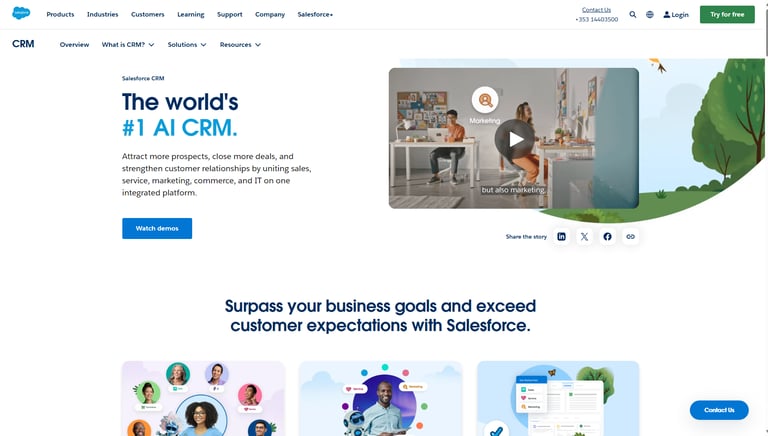

1. SalesForce
Free trial
Salesforce is a leading cloud-based CRM platform that helps businesses manage customer relationships, sales pipelines, and marketing automation.
It offers scalable solutions for businesses of all sizes, with tools for sales, customer service, and analytics to drive growth and efficiency.
Pricing starts at $25 per user/month (billed annually) for the Essentials plan, which includes basic CRM features for small businesses.








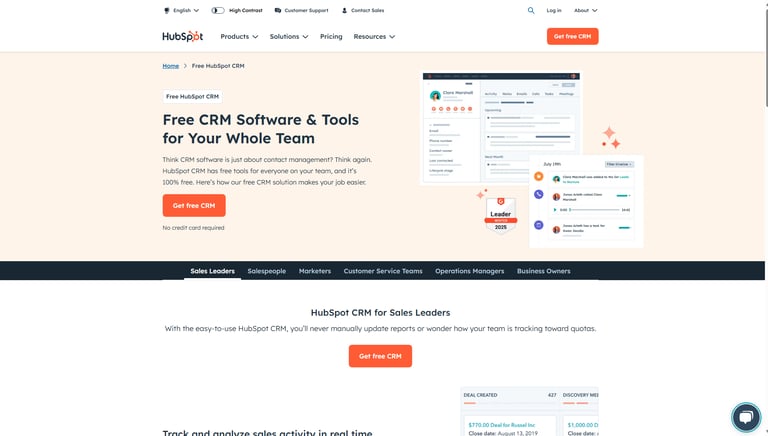

2. HubSpot
Free is enough
HubSpot CRM is an all-in-one customer relationship management platform designed to help businesses manage leads, automate marketing, and track sales.
It provides free CRM tools with options to scale through paid plans, making it a popular choice for growing businesses looking for easy-to-use automation and analytics.
Pricing starts at $20 per user/month for the Starter plan, which includes essential sales, marketing, and customer service features.
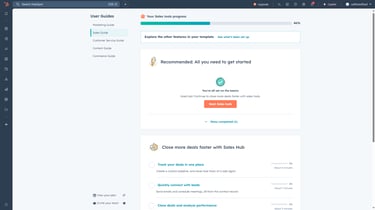
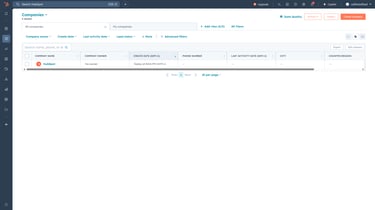
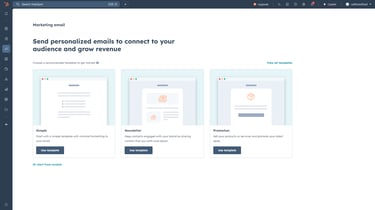
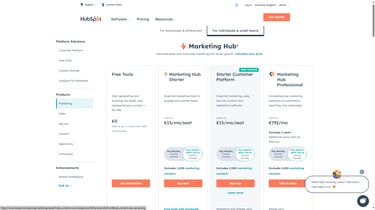






3. Zoho
Free trial



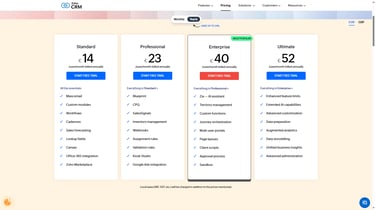




Zoho CRM is a cloud-based customer relationship management platform that helps businesses automate sales, manage leads, and enhance customer interactions.
It is known for its affordability and customization options, making it a great choice for small to medium-sized businesses looking for a scalable CRM solution.
Pricing starts at $14 per user/month for the Standard plan, which includes sales automation, workflows, and basic analytics.
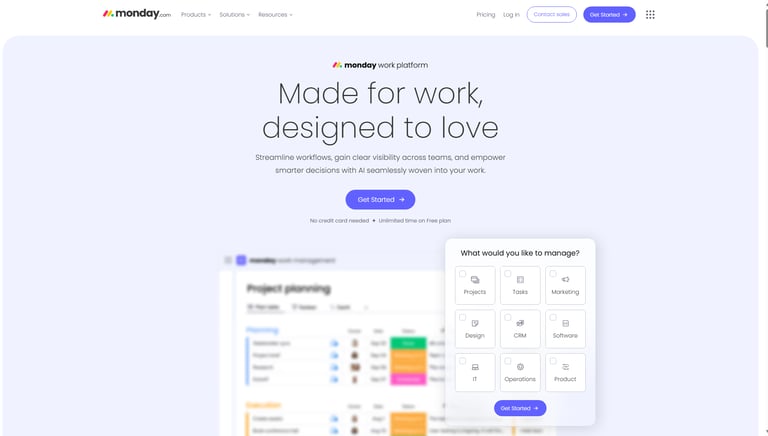

4. Monday.com
Free trial
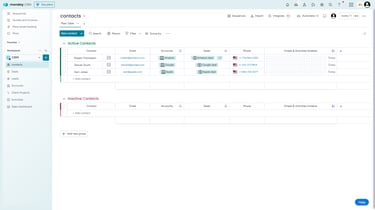
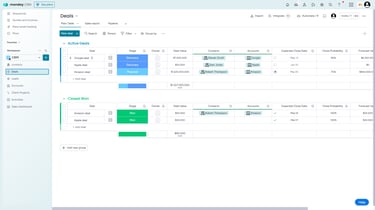
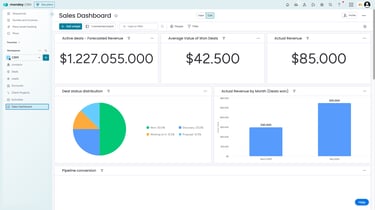
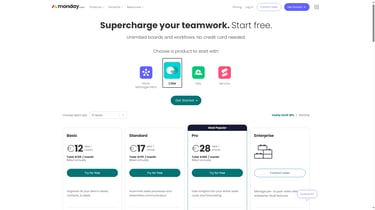




Monday.com is a versatile work management platform that helps businesses streamline sales, project management, and team collaboration.
It offers an intuitive, customizable interface that allows teams to track leads, automate workflows, and improve productivity.
Pricing starts at $9 per user/month (billed annually) for the Basic CRM plan, which includes lead management, deal tracking, and integrations.
What is CRM, and why is it important for exporters?
CRM (Customer Relationship Management) is a system that helps businesses manage and track interactions with customers and prospects. It’s essential for exporters to keep track of leads, automate follow-ups, and improve sales efficiency.
How can CRM help me manage my international clients?
Organizes all customer data in one place
Tracks emails, calls, and meetings
Automates follow-ups to avoid missed opportunities
Provides insights into customer behavior and preferences
How does a CRM improve sales performance?
It ensures that sales teams follow up on leads at the right time, keeps communication organized, and provides reports on customer interactions, helping businesses close deals faster.
Can a CRM help me track my potential buyers?
Yes, you can log all potential buyers, set reminders for follow-ups, and track their responses to your emails and calls.
How does automation in CRM save time?
Sends automatic email reminders and follow-ups
Updates customer records without manual input
Generates sales reports instantly
Can CRM integrate with my email and website?
Most CRM systems integrate with email, websites, and social media, allowing you to capture leads and track customer interactions in one place.
How does CRM improve customer service?
It stores customer history, making it easy to personalize interactions, resolve issues faster, and maintain strong relationships.
Can I use CRM to manage multiple international markets?
Yes, CRM tools support multiple currencies, time zones, and languages, making them ideal for exporters dealing with global clients.
How do I choose the right CRM for my business?
Look for features like automation, lead tracking, and reporting
Check if it integrates with your email and accounting software
Consider pricing and scalability as your business grows
Is CRM useful for small exporting companies?
Even small exporters benefit from CRM as it helps organize contacts, manage leads, and automate communication without needing a large sales team.
How secure is my data in a CRM system?
Most CRM providers offer cloud storage with strong security measures, including encryption and access control, to keep your data safe.
How can I track sales performance using CRM?
Monitor the number of deals closed vs. pending
Analyze customer engagement levels
Generate reports on sales trends over time
Can CRM help me follow up with trade fair contacts?
Yes, you can add leads from trade fairs, set follow-up reminders, and track responses to ensure you don’t lose valuable contacts.
Is it possible to access CRM on mobile devices?
Most CRM tools offer mobile apps, allowing you to manage customer interactions and track sales progress on the go.
What are common mistakes businesses make when using CRM?
Not updating customer records regularly
Ignoring automation features that save time
Using too many complex features without proper training
How can CRM help improve marketing strategies?
By tracking customer interactions, CRM provides insights into what works best, helping you refine email campaigns and sales strategies for better results.
